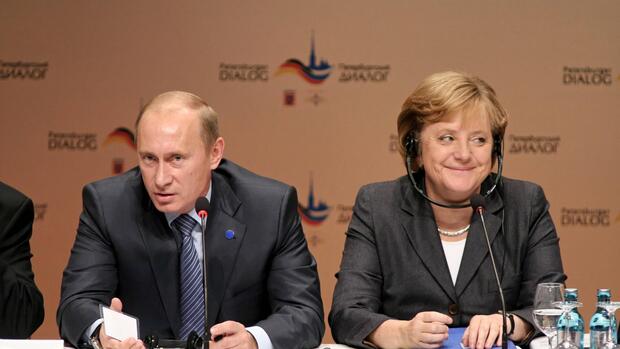A picture from the past: High-ranking guests from politics and business regularly came to the Petersburg Dialogue of the German-Russian Forum.
(Photo: imago/Gutschalk)
Berlin The German-Russian Forum was once the most important forum for exchange between the two countries. Since it was founded in 1993, the association has brought together representatives from politics, business and culture, a kind of Atlantic bridge to the east.
Chancellor Angela Merkel and Russian President Vladimir Putin used to attend the in-house event “Petersburg Dialogue”. The exchange ended abruptly with the Russian invasion of Ukraine, and the German-Russian Forum struggled with itself for its right to exist.
A quarter of the former 500 members have turned their backs on the association, the other members are arguing bitterly about the future direction. This is shown by internal documents and minutes that are available to the Handelsblatt.
A majority of the members are apparently looking for ways to keep in touch with Russia. However, the honorary chairman and former ambassador in Moscow, Ernst-Jörg von Studnitz, warns against “continuing as it is”.
Last July he wrote that this would be an invitation to seek a common future with Russia led by the “war criminal Putin”. The only field left for the forum is work with emigrated Russians. “Russia’s hopes for a European future rest on them,” writes von Studnitz.
German-Russian Forum argues about its own future
The letter met with harsh criticism internally. As a leading power in Europe, Germany cannot avoid talks with Russia, wrote Lothar de Maizière in a reply. De Maizière was the last prime minister of the GDR and later a minister in Helmut Kohl’s cabinet. His word carries weight. “Russia is so important and so close that we cannot live without a relationship forever,” he writes.
He also has a proposal ready for dealing with Putin’s Russia. The country is developing in its own way. “We can save ourselves his education,” says de Maizière.
A view apparently shared by many members of the forum. He can sign every sentence, says a member in an internal chat group. Another adds: “It only works with Russia.”
Internally, some members also openly express sympathy for Russia’s attack on Ukraine. Many understand the motives of the Russian government “to make this decision for a military solution to the long-standing crisis,” writes Alfred M. Moscow has repeatedly been condemned by a large majority by the UN General Assembly for the attack on Ukraine.
>> Read also: In April, Russia will provide the President of the UN Security Council
But there is also criticism. De Maizière’s letter, writes a still member, showed him once again “how right my resignation from the DRF was”. In a statement on the website, the association condemned the Russian war of aggression in February 2022. Another statement, published on the anniversary of the attack on February 24, 2023, is much less clear. The forum laments victims on both sides and calls on Russia, Ukraine and the West to end the war. A clear condemnation of the Russian attack is missing.
budget halved
Political work with Russia is likely to be put on hold anyway, at least until the end of the war. The forum has to find a new role, as “active cooperation with political actors in Russia (…) is not possible for the time being,” says a concept paper that was discussed at an extraordinary general meeting in November 2022.
Instead, the forum wants to focus on civil society, for example with language courses or scholarships. “In practice, this means that the association remains the point of contact in the areas of youth, junior staff and municipal connections,” said the managing director of the board, Martin Hoffmann, on request.
However, the funds for this have shrunk significantly. The budget for 2023 is 664,900 euros, half as much as in the previous year.
More: Independent UN investigation accuses Russia of war crimes.
